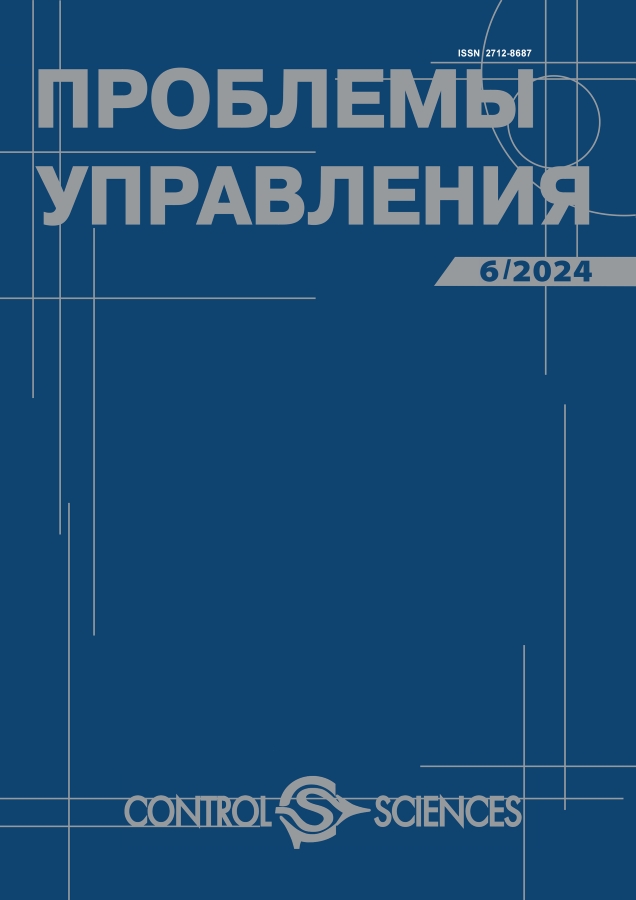№ 3 (2023)
Математические проблемы управления
Об одном методе декомпозиции для решения задач синтеза коммуникационных сетей
Аннотация
Рассматривается алгоритм решения задачи о формировании коммуникационной сети для нахождения гарантированного плана перевозок заданного объема при наличии неопределенных факторов. Объемы производств и пропускные способности коммуникаций выражены линейными функциями от вложенных ресурсов. Для решения двойственной задачи, в силу ее ступенчатой блочной структуры, применяется известный алгоритм декомпозиции Данцига – Вулфа. Возникающие на итерациях линейные задачи предлагается решать, используя их специфику, на основе эффективных сетевых методов и методов теории графов, а именно: нахождения максимального потока, минимального разреза в сети, компонент связности и минимальных остовных деревьев графов. Существующие для этих задач алгоритмы имеют оценки сложности О( ), О( ) и О(n+m), где n – число вершин графа, m – число ребер.
Проблемы управления. 2023;(3):3-11
 3-11
3-11


Анализ и синтез систем управления
Минимизация всплеска в линейной системе управления с неопределенностями при ограниченных внешних возмущениях
Аннотация
Одной из важнейших характеристик переходного процесса в линейных динамических системах при ненулевых начальных условиях является величина максимального отклонения траектории от нуля, имеющая непосредственный инженерный смысл. Если ее значение велико, говорят о наличии эффекта всплеска. Статья завершает серию работ, посвященных исследованию эффекта всплеска в линейных системах управления. Рассматривается линейная система управления, подверженная воздействию неслучайных ограниченных внешних возмущений и системных неопределенностей. Предложен регулярный подход к синтезу стабилизирующей статической обратной связи, минимизирующей величину отклонения. Подход основан на технике линейных матричных неравенств и предполагает сведение исходной задачи к параметрической задаче полуопределенного программирования, легко решающейся численно. Предложенный подход может быть распространен на новые классы задач, в частности – на случай обратной связи по выходу системы с использованием наблюдателя или динамического регулятора.
Проблемы управления. 2023;(3):12-19
 12-19
12-19


Управление в социально-экономических системах
Параметрическое управление развитием сельского хозяйства на основе когнитивного моделирования
Аннотация
С использованием концепции параметрического управления сформирована доказательная база по идентификации противоречия между увеличением объема производства сельскохозяйственной продукции и отсутствием условий для расширенного воспроизводства в отрасли, что выступает основным ограничением национального аграрного роста. Конкретизированы теоретические основы параметрического управления социально-экономическими системами и обосновано введение в процесс управления этапа параметризации управляемой системы. Указано, что выбор управленческого решения определяется на основе сопоставления оценки двух блоков параметров – потенциала внешнего управленческого воздействия и внутреннего потенциала управляемой системы. Сравнительное несоответствие результатов параметризации свидетельствует о наличии противоречия в процессе управления и определяет необходимость корректировки управленческого решения. Инструментальной основой для определения содержания противоречия в управлении развитием сельского хозяйства явились технологии нечеткого когнитивного моделирования. С применением экспертных оценок и корреляционно-регрессионного анализа на основе статистических данных за период 2000–2020 гг. была осуществлена параметризация сельского хозяйства в форме нечеткой когнитивной карты. Структурно-целевой анализ и расчет системных показателей когнитивной карты позволил выявить основные ограничения в развитии процессов аграрной динамики. Результаты когнитивного моделирования сценариев управления аграрным развитием показали, что потенциал управленческих действий по отношению к сельскому хозяйству не формирует адекватный уровень потенциала аграрного роста. Соответственно, обоснована необходимость изменения подходов к управлению сельским хозяйством для достижения устойчивости и сбалансированности аграрной динамики в долгосрочной перспективе.
Проблемы управления. 2023;(3):20-39
 20-39
20-39


Модели совместной динамики мнений и действий в онлайновых социальных сетях. Ч. 2. Линейные модели
Аннотация
На примере социальной сети ВКонтакте исследуется влияние различных факторов на динамику мнений и действий как на макроуровне («общественное мнение»), так и на микроуровне (мнения и действия отдельных агентов). Кратко рассматривается модель коллективного принятия решений, в которой в явном виде присутствуют взаимосвязанные параметры, отражающие и психические, и поведенческие компоненты деятельности агентов. Представлены результаты идентификации ее модифицированных частных случаев: линейных макро- и микромоделей совместной динамики мнений и действий агентов в социальной сети. Проведена оценка влияния различных факторов на мнения и действия агентов: обобщенного социального влияния (общественного мнения), собственных мнений и действий агента, мнений и действий социального окружения, а также механизмов доверия агента к источникам информации и содержанию информации.
Проблемы управления. 2023;(3):40-64
 40-64
40-64


Сценарно-когнитивное моделирование сложных систем на основе событийной идентификации динамики факторов
Аннотация
Работа посвящена методологическим проблемам повышения эффективности технологии сценарного анализа и моделирования процессов развития социально-экономических систем, результаты которого предназначены для использования в системах поддержки принятия управленческих решений с целью опережающей оценки их эффективности. Рассмотрен ряд ограничений традиционного подхода к сценарно-когнитивному моделированию, которые приводят прежде всего к упущению в получаемом в результате моделирования сценарии ключевых событий, непосредственно влияющих на оценку ситуации и принятие решений. Предложен подход, обеспечивающий возможность идентификации и анализа динамики изменения значений факторов модели в процессе ее исследования, а также формирование на его основе дополнительных сценарно-событийных взаимосвязей между факторами с целью повышения адекватности модели анализируемой ситуации. Разработан расчетный алгоритм анализа динамики поведения факторов модели, реализованный и апробированный в рамках программно-аналитического комплекса сценарного моделирования. Приведен пример использования алгоритма.
Проблемы управления. 2023;(3):65-76
 65-76
65-76


Управление подвижными объектами и навигация
Адаптивный алгоритм коррекции по расстоянию между стопами в навигации пешехода
Аннотация
Предложен новый алгоритм коррекции в задаче автономной навигации пешехода при помощи инерциальных измерительных блоков, закрепленных на стопах. Основой автономной пешеходной навигации является интегрирование упрощенных уравнений инерциальной навигации и коррекция навигационного решения по нулевой скорости. В отсутствие внешней информации, такой как сигналы спутниковых навигационных систем или сигналы локальных сетей Wi-Fi, Bluetooth, необходимо применять дополнительные методы коррекции. Два основных класса таких методов – коррекция по информации об ограниченности расстояния между стопами (требует установки блоков на каждую стопу) и информация о прямолинейности движения. Первый метод не учитывает неравноточность инерциальных блоков, а второй существенно зависит от типа траектории. В работе предпринята попытка избавиться от недостатков обоих методов. Новый алгоритм представляет из себя адаптивный вариант коррекции по расстоянию между стопами. Адаптивность обеспечивается изменением матрицы измерений для блока, который считается менее точным. Вывод о точности делается на основе анализа траектории, при котором используется информация о прямолинейности движения. Приведены результаты проверки алгоритма на экспериментальных данных. Применение нового алгоритма позволило увеличить точность навигации. Разработанный метод целесообразно применять в составе комплексной системы пешеходной навигации при отсутствии внешней информации.
Проблемы управления. 2023;(3):77-87
 77-87
77-87












